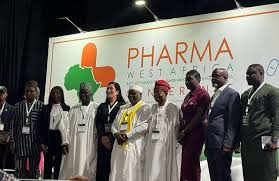Top stakeholders in Nigeria’s healthcare and pharmaceutical sectors have reiterated the urgent need to improve local drug manufacturing capacity, calling for increased investment, technology adoption, and strategic partnerships. The call was made during the 2025 Nigeria Pharmaceutical Industry Growth and Investment Summit held in Lagos.
Organised by PBR Life Sciences, the summit brought together industry leaders, private equity firms, venture capitalists, government officials, and pharmaceutical experts to chart a path for sustainable growth in Nigeria’s pharma sector.
Former President of the Pharmaceutical Society of Nigeria and CEO of Pharma Products Nigeria Limited, Ahmed Yakasai, said local players must develop scalable and structured operations. He advised pharmaceutical companies to consider mergers and other strategic moves to grow beyond producing simple formulations.
“We need companies with strong financial models and proper structures. If merging is the only way to scale up, so be it,” Yakasai said. “No pharmaceutical company is producing injectables in Nigeria today. We must move into advanced drug manufacturing, including vaccines, and position Nigeria as a pharmaceutical hub for ECOWAS and Africa.”
He noted that with proper industrial structures and strategic expansion, Nigerian pharmaceutical firms can exploit the African Continental Free Trade Area (AfCFTA) and boost exports.
The CEO of Codix Group, Sammy Ogunjimi, described the sector’s growth as slow compared to other industries like telecommunications and oil & gas. He stressed the need for homegrown solutions and domestic investment.
“The potential in this industry is massive, but not much has been done,” Ogunjimi said. “We must stop waiting for foreign solutions and begin solving our own problems with the right mindset and technology. It’s about ensuring access to essential medicines and building an industry we control.”
Ayodeji Alaran, CEO of PBR Life Sciences, also expressed concern over Nigeria’s overdependence on imported medicines, which make up 70% of the country’s drug supply. He said this dependence exposes the healthcare system to foreign exchange instability, rising costs, and global supply chain risks.
“With a population expected to surpass 377 million by 2050 and a projected pharmaceutical market worth over $1 billion by 2028, there’s no better time than now to act,” Alaran said. “Private sector innovation, capital mobilisation, and partnerships are the keys to reversing this trend. The real question is not whether we can afford to invest in local pharma manufacturing — it’s whether we can afford not to.”
He called for urgent support to build resilient, homegrown drug production systems that can meet both domestic and regional healthcare needs.
Also speaking at the summit, the National Coordinator of the Presidential Unlocking Healthcare Value-Chain Initiative, Dr Abdu Mukhtar, stressed that healthcare must be seen as a business opportunity with strong growth potential.
He said the healthcare sector only contributes about 3–4% to Nigeria’s GDP, compared to 17–18% in developed economies like the United States, highlighting the huge gap and growth potential.
“Whether it’s pharmaceuticals, hospitals, or digital health, there are many business opportunities that can grow Nigeria’s GDP,” Mukhtar said. “The life sciences sector is currently worth about $46 billion and is projected to more than double by 2030. There’s serious money to be made — and real impact.”
Mukhtar revealed that President Bola Tinubu had signed an Executive Order waiving import duties and VAT on equipment and raw materials used in local healthcare production. According to him, this move was designed to create a more enabling environment for manufacturers.
He also announced the establishment of Medipool, a new purchasing organisation approved by the Federal Executive Council. The platform will pool procurement orders and guarantee manufacturers of pharmaceutical products a certain level of demand through long-term contracts.
“This will be a game changer,” he said. “By ensuring volume and purchase guarantees, manufacturers will have more confidence to invest and produce locally. We’re also working with development finance institutions to unlock funding support for producers.”
Mukhtar expressed confidence that with sustained effort, Nigeria could manufacture at least 70% of the medicines it consumes by 2030.
Across all presentations, speakers agreed that without deliberate and sustained investments in local capacity, Nigeria will continue to depend on imported medicines, leaving its healthcare system vulnerable.
The summit closed with a renewed commitment to improve Nigeria’s pharmaceutical ecosystem, with stakeholders calling on both public and private sectors to work together to address regulatory bottlenecks, support innovation, and develop a robust pharmaceutical supply chain.
